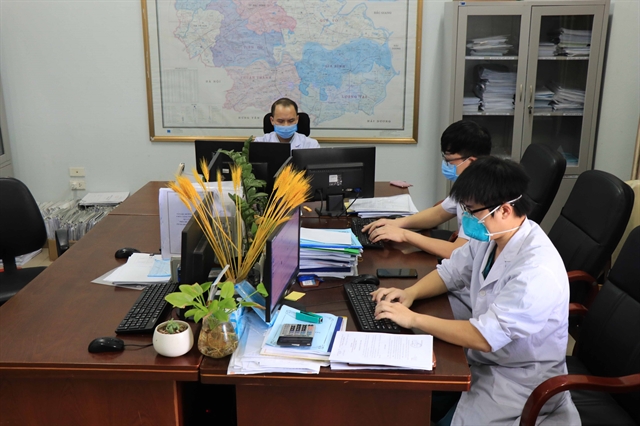 Society
Society

A group of young volunteers in northern Bắc Ninh Province has been supporting self-treating patients as the number of COVID-19 cases keeps increasing, causing significant pressure on the local health system.

|
| Doctors at aTiên Du District provide consultancy for home-care COVID-19 patients via Zalo during their lunch break. — VNA/VNS Photo Thanh Thương |
Thanh Thương
BẮC NINH — A group of young volunteers in northern Bắc Ninh Province has been supporting self-treating patients as the number of COVID-19 cases keeps increasing, causing significant pressure on the local health system.
After being set up for nearly one month, the group, jointly created by the provincial Hồ Chí Minh Communist Youth Union, the Youth Federation and the Young Doctor Association, has proved efficient in helping COVID patients feel secure.
Vũ Thi Mai, from Bắc Ninh City, tested positive for SARs-CoV-2 in mid-March. After three days, all her family members were infected, forcing them to isolate at home.
Her family met many difficulties as they could not go out to buy food and medicine.
However, with the support of the volunteers, things started to become easier.
"I needed consultancy from medical workers. After learning about the volunteer group via a social network, I could chat with medical workers and get detailed guidelines and consultancy about COVID-19 symptoms and treatment at home, particularly how to take care of my kids," she said.
Members of the group also helped Mai buy medicines and deliver them to her house.
Nguyễn Thị Ngọc Ánh, a worker from northern Thái Nguyên Province, came to Bắc Ninh to find a job but then was infected with the virus and was self-isolated in her rented room.
It left her facing more difficulties as she could not find a job and had to stay at home.
"Most of the people in my place are infected with the virus, so I could not ask them to go out to buy medicine. As a newcomer to the province, I did not know many people. Luckily, the young volunteers helped me overcome my difficulties," she said.
"I was advised on how to self-treat at home by the group's doctors. The young volunteers helped buy medicine and food and delivered them to my place. I felt more secure at home with their support."
Ánh said she hoped this model would be expanded, particularly at boarding houses in industrial zones, to help disadvantaged workers in tough times.
The head of the volunteer group, Dương Ngọc Duyến, said sub-groups had been established across the province to work around the clock to support patients.
The group has mobilised more than 500 people, including experienced doctors and nurses.
The group provides patients with psychological counselling and information related to treatment at home; and deliver medicines, medical equipment and necessities to patients.
The group has two people working as information coordinators via its Zalo group chat to avoid missing any questions. They receive patients' questions for medical workers to answer directly.
Patients who need direct help can request volunteers to come to their homes.
Local volunteers in communes and districts also visit patients in remote areas to provide them with prompt support.
Since it started on March 1, the group has received and answered more than 2,000 questions from over 500 patients and helped buy and deliver medicines and food for hundreds of households.
Joining the group from the first days, Dr Nguyễn Ngọc Hoàng of Tiên Du District Healthcare Centre said he understood patients' worries and tried to provide directions to help improve their self-treatment.
He also updates information related to State regulations and policies regarding isolation and treatment.
Apart from providing online medical consultancy, he has also participated in a local health sector group to give offline advice.
Although busy with work, Hoàng often uses his break time, lunch or evening to support patients and provide assistance to them.
The timely support of the young volunteers has helped ease the burden on the local health system and made patients feel safe when treating themselves at home. — VNS




